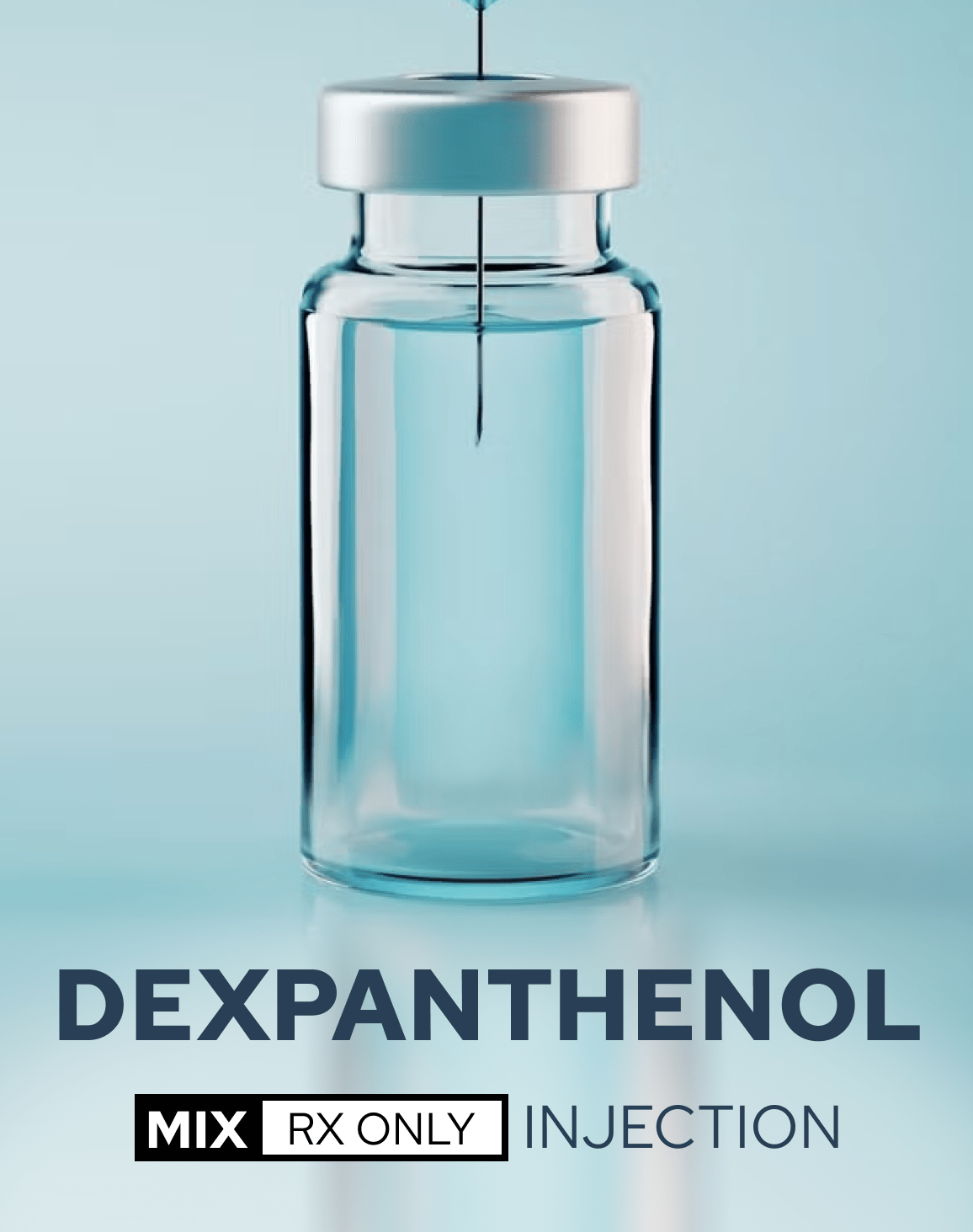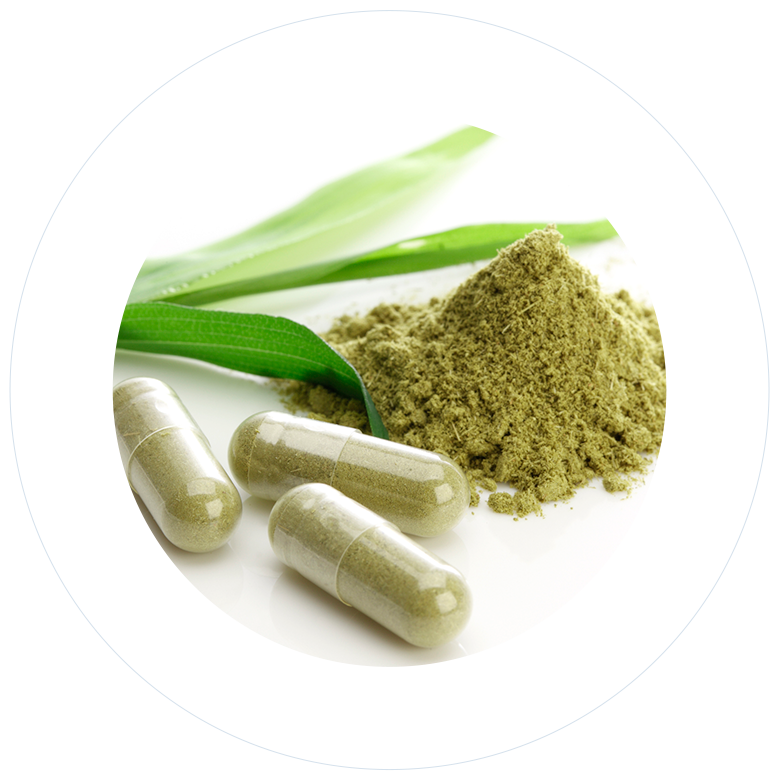Dexpanthenol Injection
Purchase Dexpanthenol Injection for quick recovery and relief. Ideal for skin and mucous membrane healing. Order now for prompt delivery.
SHARE THIS PRODUCT:
What is Dexpanthenol Injection?
Dexpanthenol injection, also known as Vitamin B5 injection, is a high-quality, pharmaceutical-grade solution used in medical practices. It is a water-soluble vitamin essential for various metabolic processes within the body. This critical nutrient is involved in energy production, hormone synthesis, and maintaining healthy skin, hair, and nails. By supporting energy metabolism, dexpanthenol facilitates the conversion of food into energy, thus promoting overall wellness.
Healthcare providers utilize dexpanthenol injections to ensure patients receive the necessary amounts of this vitamin, especially in cases where dietary sources are insufficient. This injection is especially valuable in medical settings, such as IV therapy clinics and surgical recovery units, where rapid and effective nutrient delivery is essential. Dexpanthenol also aids in the rapid healing of bodily tissues, making it an indispensable tool for physicians and healthcare providers aiming to optimize patient recovery and health outcomes.
The Role of Vitamin B5 in the Body
Vitamin B5, or dexpanthenol, plays a pivotal role in the body’s metabolism. It is a component of coenzyme A, which is crucial for the metabolism of carbohydrates, proteins, and fats. This coenzyme aids in the production of energy by breaking down these macronutrients. Furthermore, vitamin B5 is essential for synthesizing hormones such as cortisol, which helps the body respond to stress. It also supports the production of neurotransmitters like acetylcholine, which are vital for nerve signaling.
Additionally, vitamin B5 plays a significant role in maintaining healthy skin by supporting the repair and regeneration of tissues. It enhances the strength and luster of hair and nails, ensuring they remain healthy. Overall, dexpanthenol injection supports numerous key functions in the body, making it a valuable nutrient for maintaining vitality and overall health.
Indications for Dexpanthenol Injection Use
Dexpanthenol injections are frequently used to treat vitamin B5 deficiencies, which can manifest in symptoms such as fatigue, depression, irritability, numbness, and muscle cramps. These injections are also employed to support post-surgical recovery, particularly after abdominal surgeries, where they aid in the regeneration of tissues and speed up the healing process.
Additionally, dexpanthenol plays a role in various medical treatments that deplete the body’s vitamin B5 levels, making it vital for patients undergoing such therapies. It can also be used for conditions that impair the absorption of nutrients, ensuring that patients receive the necessary levels of vitamin B5. Overall, dexpanthenol injections are integral in providing comprehensive care for patients requiring enhanced recovery, improved metabolic function, and better nutrient absorption.
Dosage and Administration
Recommended Dosage for Dexpanthenol
The recommended dosage for dexpanthenol injection differs depending on the patient’s individual condition, age, and medical history. Generally, healthcare providers administer dosages ranging from 500 mg to 1,500 mg per day. It is crucial to follow a healthcare provider’s guidance to determine the precise dosage required for optimal benefits.
The dosage may also vary based on the specific medical conditions being treated, such as vitamin B5 deficiency or post-surgical recovery. Adherence to the recommended dosage ensures the effectiveness of the treatment while minimizing potential side effects. Overdosing should be strictly avoided, as it could lead to adverse effects. Following professional advice for dosage helps in achieving desired health outcomes in a safe and controlled manner.
How to Administer Dexpanthenol Injections
Dexpanthenol injections must be administered by a trained healthcare professional to ensure safety and efficacy. These injections are typically given either intramuscularly or intravenously, depending on the patient’s specific needs and medical condition. The injection site should be cleaned with an antiseptic to prevent infection.
Proper aseptic techniques must be followed during administration to avoid contamination. The healthcare provider will determine the appropriate method based on the patient’s condition. Accurate administration techniques are crucial in ensuring that the patient receives the full benefits of dexpanthenol injection, thereby promoting effective treatment outcomes. Patients should follow their healthcare provider’s instructions carefully for optimal results.
Benefits of Dexpanthenol Injections
Dexpanthenol injections offer several benefits, particularly in medical and therapeutic settings. Primarily, they are highly effective for addressing vitamin B5 deficiencies. Vitamin B5 is crucial for various metabolic functions, and its deficiency can lead to fatigue, muscle cramps, and other health issues.
Additionally, dexpanthenol injections are beneficial for enhancing post-surgical recovery, particularly after abdominal surgeries. These injections speed up tissue healing and reduce inflammation, leading to quicker recovery times. By ensuring rapid absorption of Vitamin B5, dexpanthenol injections also support energy production and overall well-being, making them a valuable tool in various medical treatments.
Moreover, their efficacy and safety make them a trusted choice among healthcare providers for improving patient outcomes. Overall, dexpanthenol injections are integral in promoting health and recovery, making them essential for medical and wellness practices.
Enhancing Recovery Post-Abdominal Surgery
Dexpanthenol injections significantly enhance recovery post-abdominal surgery by promoting faster tissue healing and reducing inflammation. When administered, these injections aid in the regeneration of tissues, ensuring quick and effective healing of surgical wounds. This function is crucial in post-surgical care, where reducing recovery time and minimizing complications are essential for patient well-being.
The anti-inflammatory properties of dexpanthenol further support this recovery process, making it easier for patients to regain normal function and comfort more quickly. Healthcare providers frequently incorporate dexpanthenol injections into post-operative care regimens due to these benefits. By speeding up the healing process, these injections help in reducing the risk of infections and other complications associated with surgical wounds. Overall, dexpanthenol injections are a valuable tool for enhancing post-abdominal surgery recovery, leading to better patient outcomes and satisfaction.
Addressing Vitamin B5 Deficiency
Dexpanthenol injections effectively address vitamin B5 deficiency, which can manifest in symptoms such as fatigue, irritability, depression, numbness, and muscle cramps. Vitamin B5 is essential for converting food into energy and maintaining overall metabolic functions. Administering dexpanthenol injections ensures that patients receive the necessary levels of this vitamin, alleviating deficiency symptoms and restoring normal bodily functions. This is particularly important for individuals who cannot absorb vitamin B5 effectively through their diet or have conditions that deplete this nutrient.
Regular administration of dexpanthenol helps maintain adequate levels of this vital nutrient, promoting overall health and well-being. By addressing vitamin B5 deficiency, these injections support energy production, enhance mood, and improve overall vitality. Healthcare providers rely on dexpanthenol injections as a reliable solution for treating this deficiency, ensuring optimal patient health outcomes.
Potential Side Effects and Allergic Reactions
Dexpanthenol injections are typically safe, but like all medical treatments, they can have potential side effects and allergic reactions. It’s important for patients and healthcare providers to be aware of these potential issues to ensure safe and effective use. Common side effects may include mild pain, redness, or swelling at the injection site. Some patients might also experience nausea or gastrointestinal discomfort.
While these side effects are generally mild and temporary, patients should monitor their symptoms and consult a healthcare provider if they persist. In rare cases, allergic reactions can occur, presenting symptoms such as rash, itching, dizziness, or difficulty breathing. Recognizing these symptoms early and seeking immediate medical attention is crucial for patient safety. Overall, understanding the potential side effects and allergic reactions ensures that dexpanthenol injections are used safely and effectively.
Common Side Effects
The common side effects of dexpanthenol injections include mild pain, redness, and swelling at the injection site. These reactions are generally mild and disappear on their own without the need for additional treatment. Some patients may also experience nausea, vomiting, or mild gastrointestinal discomfort following the injection. These side effects are usually temporary and subside as the body adjusts to the treatment. It is essential for patients to follow the administration guidelines provided by their healthcare provider to minimize the risk of these side effects.
In most cases, these side effects are manageable and do not interfere with the overall benefits of the treatment. Patients should monitor their symptoms and report any persistent or worsening side effects to their healthcare provider. Understanding these common side effects helps in ensuring the safe and effective use of dexpanthenol biotin injections.
Recognizing Allergic Reactions
Recognizing allergic reactions to dexpanthenol injections is crucial for ensuring patient safety. Although rare, allergic reactions can occur and may present symptoms such as rash, itching, dizziness, or difficulty breathing. Patients should be vigilant and aware of these potential signs and seek immediate medical attention if they experience any of these symptoms. Informing healthcare providers about any known allergies before receiving dexpanthenol biotin injections can help prevent potential allergic reactions. It’s also important for patients to provide a complete medical history to their healthcare provider to ensure the safe use of these injections.
Early recognition and prompt medical intervention are essential for managing allergic reactions effectively. By understanding and identifying the signs of an allergic reaction, patients and healthcare providers can ensure that dexpanthenol injections are administered safely and effectively.
Precautions and Contraindications
When considering dexpanthenol biotin injections, it’s crucial to be aware of the necessary precautions and contraindications to ensure safe and effective use. These injections should be administered under the guidance of a healthcare professional who can evaluate the benefits and potential risks for each patient. Special precautions are required for pregnant and breastfeeding women, as well as patients with certain medical conditions.
Dexpanthenol injections can interact with various medications, so it’s essential to inform your healthcare provider about all medications and supplements you are currently taking. By understanding these precautions and contraindications, healthcare providers can ensure that dexpanthenol biotin injections are used safely and are tailored to meet the individual needs of each patient, thus optimizing treatment outcomes.
Pregnancy and Breastfeeding Considerations
During pregnancy and breastfeeding, special considerations must be taken when using dexpanthenol biotin injections. While there are no well-documented adverse effects, it is essential to consult with a healthcare provider before using these injections if you are pregnant or breastfeeding. The healthcare professional will evaluate the potential benefits and risks to determine the best course of action.
Close monitoring is necessary to ensure the safety of both the mother and the baby. Pregnant and breastfeeding women should always adhere to the advice provided by their healthcare provider to ensure the safe and effective use of dexpanthenol biotin injections. By following these guidelines, the potential risks can be minimized, ensuring the health and well-being of both the mother and the baby.
Drug Interactions and Cautions
Dexpanthenol biotin injections can interact with various medications, making it crucial to inform your healthcare provider about all the medications, supplements, and herbal products you are currently using. These interactions can either diminish the effectiveness of the injections or cause adverse effects. Specific caution should be exercised for patients on medications that affect metabolic pathways, as these could potentially interact with dexpanthenol.
Understanding and managing these interactions is essential for ensuring the safe and effective use of these injections. By providing a complete list of current medications to your healthcare provider, you can help identify potential interactions and take necessary precautions. This ensures that biotin dexpanthenol injections are used safely and effectively, optimizing patient health outcomes.
Storage and Handling of Dexpanthenol Injections
Proper storage and handling of dexpanthenol injections are crucial for maintaining their effectiveness and ensuring patient safety. These injections should be stored in a cool, dry place away from direct sunlight to prevent degradation. The vials must remain sealed until use to avoid contamination. Adherence to proper sterilization techniques during handling ensures the safety and purity of the injections.
It’s also important to check the expiration date before administering the injection and to dispose of any expired or damaged vials properly. Following these guidelines, provided by private label supplement manufacturers, ensures that biotin dexpanthenol injections remain safe and effective for patient use. By maintaining proper storage and handling practices, healthcare providers can ensure optimal treatment outcomes and patient safety.
What is dexpanthenol used for?
Dexpanthenol is used to treat vitamin B5 deficiencies and enhance post-surgical recovery. These injections play a crucial role in supporting energy metabolism, hormone synthesis, and tissue health. They are particularly beneficial for patients who require rapid nutrient delivery or have conditions affecting nutrient absorption. By administering dexpanthenol, healthcare providers can ensure that patients receive the necessary levels of this essential vitamin, promoting overall health and well-being. The injections are commonly used in medical practices where effective vitamin B5 delivery is crucial for patient recovery and maintenance of overall health.
Can biotin dexpanthenol injections help with wound healing?
Yes, biotin dexpanthenol injections aid in wound healing by promoting tissue repair and reducing inflammation. They are particularly effective in enhancing recovery after abdominal surgeries. By accelerating tissue regeneration, these injections help surgical wounds heal quicker and more efficiently. This can significantly reduce the risk of infections and other complications associated with surgical recovery.
Healthcare providers often incorporate biotin dexpanthenol injections into post-operative care regimens for this reason. The use of biotin dexpanthenol injections in wound healing not only speeds up the recovery process but also improves patient comfort and overall health outcomes.
Are there any dietary sources of Vitamin B5?
Vitamin B5 is found in various dietary sources, including eggs, fish, poultry, whole grains, and legumes. These foods can generally provide sufficient amounts of the vitamin for most individuals. However, in cases where dietary intake is insufficient or absorption is impaired, dexpanthenol injections may be necessary to ensure adequate levels of vitamin B5 in the body.
This is especially important for individuals with conditions affecting nutrient absorption or those undergoing treatments that deplete this essential vitamin. By supplementing with biotin dexpanthenol injections, healthcare providers can ensure that patients meet their daily vitamin B5 requirements, promoting overall health and vitality.
Check out Legere Pharmaceuticals’ IV supplements, lipo mino mix injections, L-Carnitine Injections, Magnesium Chloride Injections, Acid Blend Injections, Ascorbic Acid Injections, Alpha Lipoic Acid Injections, Biotin Injections, and other offerings.
Jon Legere
Jon Legere is the Director of Marketing at Legere Pharmaceuticals, where he oversees all strategic marketing initiatives, brand development, and customer engagement efforts. With an MBA and 11 years of specialized experience in the dietary supplement industry, Jon brings a wealth of knowledge in consumer behavior, product positioning, and digital marketing strategies. His expertise has been pivotal in driving growth, innovation, and market share for Legere Pharmaceuticals, as he remains committed to promoting health and wellness through cutting-edge supplements.
Legere: Your Partner in Success

Ready to Start Growing Your Practice? Let’s Chat!
Schedule a no obligation/no-pressure call to quickly increase your weight loss clinic’s revenue.





